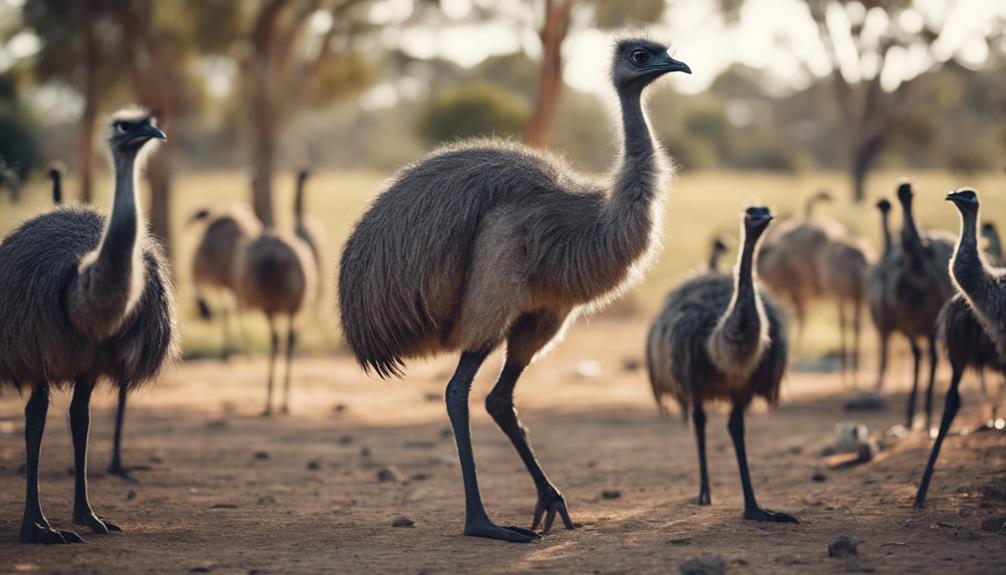
Emu farming may seem like a straightforward endeavor, but the challenges that come with it can often feel insurmountable.
From navigating breeding complexities to ensuring regulatory compliance, each aspect of this industry demands attention to detail and perseverance.
As you navigate the world of emu farming, you will quickly realize that overcoming these common obstacles is essential for the success and sustainability of your operation.
Key Takeaways
- Genetic selection and diversity are crucial for breeding success.
- Proper feeding and health management ensure optimal growth and productivity.
- Compliance with regulations and infrastructure maintenance are vital for farm operations.
- Diversification, market analysis, and sustainability drive business success in emu farming.
Breeding Challenges

Breeding emus can pose significant challenges due to their complex mating behaviors and specific environmental requirements. To enhance reproductive success, genetic selection plays a crucial role in emu farming. When choosing breeding pairs, it's essential to consider their genetic makeup to ensure desirable traits are passed on to offspring. Emus with strong genetics are more likely to produce healthier chicks, contributing to the overall success of the breeding program.
Genetic selection involves carefully evaluating traits such as size, temperament, and disease resistance. By selecting emus with optimal genetics, farmers can improve the overall quality of their flock and increase reproductive success. Additionally, monitoring the genetic diversity within the breeding population is vital to prevent inbreeding and maintain a healthy gene pool.
Feeding Practices
When it comes to optimizing the growth and health of your emu flock, implementing effective feeding practices is essential. Feeding efficiency and maintaining a proper nutritional balance are key factors in ensuring the well-being of your emus. Emus have specific dietary requirements that must be met to support their growth and overall health.
Seasonal variations can pose challenges in maintaining consistent feed availability for your emus. During certain times of the year, such as winter when natural forage may be scarce, you may need to supplement their diet with additional feed to meet their nutritional needs. It's important to carefully monitor your emus' body condition and adjust their feeding regimen accordingly to prevent deficiencies or excesses.
To enhance feeding efficiency, consider working with a nutritionist to develop a well-rounded diet plan tailored to your emus' specific needs. Regularly assess the quality and quantity of feed provided to ensure that your emus are receiving adequate nutrition for optimal health and growth. By staying attentive to seasonal variations and consistently monitoring their diet, you can overcome feeding challenges and support the well-being of your emu flock.
Health Management

Maintaining the optimal health of your emu flock involves proactive health management practices to address potential issues and ensure their well-being. To keep your emus healthy and thriving, focus on preventive care and disease control. Here are some essential tips for effective health management:
- Regular Health Checks: Schedule routine check-ups with a veterinarian to monitor the overall health of your emus and catch any potential issues early on.
- Vaccination Protocols: Stay up to date with recommended vaccinations to prevent common diseases and boost the immune system of your emus.
- Hygiene Practices: Implement strict hygiene measures within your emu farm to reduce the risk of infections and diseases spreading among the flock.
Infrastructure Needs
To ensure the successful operation of your emu farm, it is crucial to establish the necessary infrastructure for the well-being and comfort of your emus. Proper housing requirements and regular maintenance are essential aspects to consider when setting up your emu farm. Emus need shelter that protects them from extreme weather conditions and predators. Additionally, ensuring a clean and hygienic living environment is vital for their health and overall well-being. Here is a table outlining key infrastructure needs for your emu farm:
| Infrastructure Needs | Description | Importance |
|---|---|---|
| Housing Requirements | Shelter from elements | High |
| Maintenance | Regular cleaning | Essential |
| Water Supply | Fresh, clean water | Critical |
| Sanitation | Waste management | Crucial |
| Security Measures | Protection from predators | Important |
Regulatory Compliance

Establishing compliance with regulatory requirements is a fundamental aspect of managing an emu farm efficiently and responsibly. To ensure your farm meets all necessary standards, consider the following key points:
- Permit Requirements: Familiarize yourself with the specific permits needed to operate an emu farm in your area. Understanding these requirements will help you avoid potential legal issues and keep your operation running smoothly.
- Inspection Process: Be prepared for regular inspections to verify your compliance with regulations. Maintaining a clean and organized farm won't only impress inspectors but also demonstrate your commitment to following guidelines.
- Compliance Training, Record Keeping: Invest time in training yourself and your staff on compliance protocols. Additionally, keep detailed records of activities such as medication administration, feed purchases, and health assessments. These records won't only aid in compliance but also contribute to the overall efficiency of your farm management.
Pest and Predators
Familiarizing yourself with common pests and predators that pose a threat to your emu farm is crucial for ensuring the safety and well-being of your flock. Implementing effective pest control measures is essential to protect your emus from harmful insects and parasites. Regularly inspecting your farm for signs of infestation and promptly addressing any issues can help prevent potential health risks to your birds.
In addition to pest control, predator prevention is a key aspect of safeguarding your emu farm. Installing secure fencing around your property, using motion-activated lights, and even employing guard animals are all effective security measures to deter predators. Consider investing in surveillance systems to monitor your farm remotely and quickly respond to any suspicious activity.
Weather Impacts

Understanding the impact of weather conditions on your emu farm is crucial for maintaining the health and well-being of your flock. Emus are sensitive to temperature fluctuations and environmental changes, making it essential to provide proper shelter and care. Here are three key aspects to consider:
- Shelter Requirements: Emus need adequate shelter to protect them from extreme weather conditions such as heatwaves, heavy rainfall, or cold snaps. Ensure their living quarters are well-insulated and offer protection from harsh winds.
- Seasonal Changes: Be mindful of how seasonal variations can affect your emus. Adjust their diet, monitor their water intake, and make any necessary changes to their living conditions as the seasons shift.
- Temperature Regulation: Emus struggle to regulate their body temperature in extreme climates. Install misting systems or fans to help them cool down during hot weather and provide heat sources in colder months to prevent hypothermia. Stay vigilant and adapt your farm management practices accordingly to ensure your emus thrive despite climate fluctuations.
Market Demand
To effectively meet the demands of the market, it is essential to conduct thorough research and analysis of consumer preferences and trends in the emu farming industry. Understanding pricing strategies and consumer trends is crucial for positioning your products effectively. Additionally, addressing supply chain and distribution challenges is vital to ensure a steady flow of products to meet market demand. Below is a table summarizing key points to consider in relation to market demand:
| Market Demand | Key Points to Consider |
|---|---|
| Pricing Strategies | Research competitive pricing and adjust accordingly. |
| Consumer Trends | Stay updated on changing consumer preferences and adapt products. |
| Supply Chain | Ensure efficient transportation and logistics to meet demand. |
| Distribution Challenges | Identify obstacles in reaching target markets and find solutions. |
| Market Analysis | Conduct regular assessments to stay ahead of market shifts. |
Product Diversification

Exploring new avenues for product diversification can enhance the competitiveness and sustainability of your emu farming business. To achieve this, consider conducting a thorough market analysis to identify emerging trends and consumer preferences. Understanding the market will help you tailor your products to meet the demands of your target audience effectively.
Additionally, investing in product innovation is crucial for staying ahead in the competitive emu farming industry. Introducing unique emu-based products or creating value-added products from different parts of the emu can attract new customers and set your business apart from competitors.
- Market Analysis: Conduct regular market research to stay informed about changing consumer preferences and market dynamics.
- Product Innovation: Continuously explore new product ideas and techniques to keep your offerings fresh and appealing.
- Diversified Product Range: Expand your product line to cater to a broader customer base and increase revenue streams.
Financial Planning
Developing a robust financial plan is essential for ensuring the long-term success and stability of your emu farming business. When it comes to budgeting strategies, it's crucial to meticulously outline your expenses, including feed, veterinary care, equipment maintenance, and marketing. Consider creating a detailed budget that accounts for both ongoing operational costs and potential unforeseen expenses. This will help you stay financially prepared and avoid any cash flow problems that could hinder your farm's growth.
In terms of investment opportunities, carefully research options that align with your long-term goals. Whether it's expanding your current facilities, implementing new technology for efficiency, or diversifying into related industries, strategic investments can propel your emu farming business forward. Evaluate the potential risks and returns of each opportunity before making decisions, ensuring they fit within your overall financial plan.
Staff Training

For a successful emu farming operation, ensuring your staff receives proper training is crucial to maintaining high standards of care and efficiency. Proper training techniques not only equip your employees with the necessary skills but also contribute to staff retention by fostering a sense of value and investment in their roles.
To enhance skill development and employee engagement, consider the following:
- Hands-On Training: Implement practical, hands-on training sessions where employees can directly engage with the tasks they'll be performing. This approach allows for better understanding and retention of information.
- Regular Workshops: Conduct regular workshops to update employees on new techniques, technologies, and best practices in emu farming. This continuous learning approach keeps staff engaged and motivated.
- Cross-Training Opportunities: Encourage cross-training among your staff to develop a versatile team capable of handling various aspects of emu farming. This not only enhances individual skill sets but also promotes teamwork and collaboration within the farm.
Sustainability Strategies
To enhance the long-term viability of your emu farming operation, implementing sustainable strategies is essential for minimizing environmental impact and maximizing resource efficiency. When it comes to resource efficiency, optimizing feed usage, water consumption, and energy sources can significantly benefit your farm. Additionally, effective waste management practices are crucial to reduce environmental footprint and operational costs. Consider composting organic waste to create nutrient-rich fertilizers for your crops or utilizing biogas technology to convert animal waste into energy.
| Resource Efficiency | Waste Management |
|---|---|
| Optimize feed usage | Compost organic waste |
| Efficient water consumption | Convert waste to energy |
| Utilize renewable energy sources | Implement recycling programs |
| Monitor energy consumption | Proper disposal methods |
Frequently Asked Questions
How Do Emu Farmers Handle the Emotional Challenges of Breeding and Raising Animals for Profit?
Handling the emotional challenges of emu farming involves managing stress by focusing on the well-being of your animals. Utilize coping mechanisms like mindfulness, seeking support from fellow farmers, and taking breaks to recharge. Remember, your mental health matters in this demanding field.
What Impact Does Emu Farming Have on Local Ecosystems and Wildlife Populations?
Emu farming can disrupt local ecosystems by altering vegetation and water sources, impacting wildlife populations. It's crucial to implement sustainable practices to minimize these effects. Remember, even small changes can make a big difference in preserving nature's balance.
Are There Any Specific Cultural or Religious Considerations That Affect Emu Farming Practices?
In emu farming, cultural traditions and religious practices can influence breeding, harvesting, and consumption. Understanding these aspects helps navigate respectful and sustainable practices. Embrace diversity and adapt methods to honor these beliefs in your operations.
How Do Emu Farmers Navigate the Ethical Dilemmas of Selling Emu Products for Profit?
How do you ensure ethical marketing in selling emu products for profit? By prioritizing consumer awareness, sustainability practices, and industry standards. Are you embracing transparency to navigate the ethical dilemmas with integrity and build trust with your customers?
What Are Some Unique Ways That Emu Farmers Contribute to Their Local Communities Beyond Just Providing Products for Sale?
In your local community, emu farmers engage in various initiatives like educational workshops on sustainable practices, hosting farm tours, and participating in farmers' markets. Their dedication to community engagement fosters a deeper connection and appreciation for emu farming.
Conclusion
Overall, navigating the challenges of emu farming requires careful planning and strategic decision-making. By addressing breeding challenges, implementing proper feeding practices, ensuring health management, investing in infrastructure, complying with regulations, and diversifying products, you can overcome common obstacles in this industry.
Planning finances, training staff, and adopting sustainable strategies are also crucial components to success in emu farming. Remember, just like the emu bird itself, with determination and perseverance, you can successfully overcome any hurdles that come your way. Keep pushing forward and never give up.




